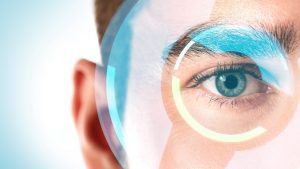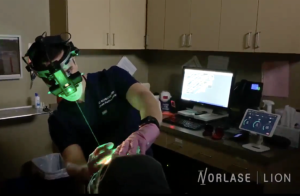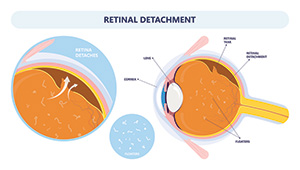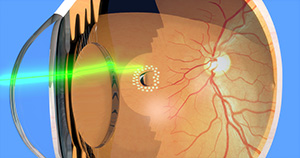Retinal Laser Treatment in Baltimore
Also Serving Pikesville, Catonsville, Glen Burnie, & Rosedale
 Laser technology is a valuable tool in the Elman Retina Group’s toolkit for the treatment of common retinal conditions. Retinal lasers allow our doctors to successfully manage problems like diabetic retinopathy, diabetic macular edema, retinal tears, cystoid macular edema and central serous retinopathy without harming non-retinal tissues in the eye. With our extensive training in the treatment and management of retinal diseases, you can feel confident that you are in good hands at Elman Retina Group.
Laser technology is a valuable tool in the Elman Retina Group’s toolkit for the treatment of common retinal conditions. Retinal lasers allow our doctors to successfully manage problems like diabetic retinopathy, diabetic macular edema, retinal tears, cystoid macular edema and central serous retinopathy without harming non-retinal tissues in the eye. With our extensive training in the treatment and management of retinal diseases, you can feel confident that you are in good hands at Elman Retina Group.
When is Retinal Laser Therapy Needed?
Laser therapy is minimally invasive and can be completed during a relatively short, in-office procedure. Surgery, needles and anesthesia are not necessary, and any aftereffects are usually temporary and quickly resolve on their own. Most patients who undergo laser therapy for retinal problems can resume work and their normal routines on the same day.
Focal Laser for Macular Edema
Focal laser is often recommended for cases of macular edema, commonly from diabetes or retinal vein occlusions. The heat response generated by the low-energy laser cauterizes leaking blood vessels and eliminates fluid buildup in the retina. Though focal laser treatment doesn’t always restore vision lost to macular edema, it can delay or prevent additional vision loss.
Barricade Laser for Retinal Tear/Detachment
Barricade argon laser treatment can stop a retinal tear from progressing to a serious retinal detachment. The laser energy is directed at the retina and creates a deliberate pattern of “spots” that evolve into a scar. This scar tissue welds the edges of the tear to the underlying tissue, forming a barricade to stop fluid from getting under the tear.
Panretinal Photocoagulation for Diabetic Retinopathy and Other Neovascularization Diseases
 Panretinal photocoagulation is frequently recommended to mitigate the risk of vision loss to diabetic retinopathy, retinal vein occlusion and other neovascularization diseases (e.g., conditions wherein abnormal blood vessels develop and interfere with the normal flow of oxygen and nutrients to the eye). During pan-retinal photocoagulation, an argon laser is used to curb abnormal blood vessel growth in the retina, reducing the likelihood of related vision loss and blindness.
Panretinal photocoagulation is frequently recommended to mitigate the risk of vision loss to diabetic retinopathy, retinal vein occlusion and other neovascularization diseases (e.g., conditions wherein abnormal blood vessels develop and interfere with the normal flow of oxygen and nutrients to the eye). During pan-retinal photocoagulation, an argon laser is used to curb abnormal blood vessel growth in the retina, reducing the likelihood of related vision loss and blindness.
MicroPulse Laser for Macular Edema and Central Serous Retinopathy
As its name suggests, the MicroPulse laser divides a continuous wave of laser energy into shorter, low-energy pulses separated by brief “cool off” intervals. The rest periods prevent the buildup of heat that could potentially cause thermal damage to the retinal tissue. MicroPulse laser technology is often used in the treatment of macular edema, central serous retinopathy and other retinal conditions.
Safe Care You Can Trust at Elman Retina Group
Retinal laser therapy is best left to a specially trained doctor who has experience with state-of-the-art laser technology. Drs. Michael Elman and Sid Schechet of Elman Retina Group understand how to leverage laser energy in different ways, according to the area of the retina that requires treatment. Our doctors are knowledgeable in the various types of lasers, and skilled in selecting the most appropriate laser wavelength for the problem at hand. Although laser therapy ultimately cannot restore vision that has already been lost, it can protect our patients from suffering additional complications, including blindness.
FAQs
Why Are Lasers Used to Treat Retinal Conditions?
 Lasers are a standard and highly effective treatment for retinal diseases. Concentrated light beams can address damage caused by diabetic retinopathy and are designed to pass through the lens and cornea without affecting those tissues and structures. The retina at the back of the eye absorbs the light energy and converts it to heat to alter the retina and correct or address retinal disease or injury.
Lasers are a standard and highly effective treatment for retinal diseases. Concentrated light beams can address damage caused by diabetic retinopathy and are designed to pass through the lens and cornea without affecting those tissues and structures. The retina at the back of the eye absorbs the light energy and converts it to heat to alter the retina and correct or address retinal disease or injury.
Laser technology works to close damaged blood vessels and seal tears in the retina or eliminate abnormal tissues. Laser treatment is a powerful tool because the light rays target the damaged retina. These technologies offer precise treatment that leaves behind minimal scar tissue and helps the eye heal faster.
Will I Need Additional Laser Treatment?
Our ophthalmologists will monitor your progress after retinal laser treatment. It may take several months to see the full effects and determine how effective the laser was in improving or correcting your retinal damage. Depending on the condition and its severity, some patients require additional laser treatment to manage their symptoms and prevent further vision problems.
What Happens During Retinal Laser Treatment?
The details of your retinal laser surgery depend on your condition. Retinal laser treatment is a non-invasive procedure performed at our office by our board-certified ophthalmologists. Our eye doctors dilate your pupils and place local anesthetic eye drops in your eye to numb the tissues and ensure you’re comfortable during laser surgery. A special device holds your eyelids apart, and a microscope and lens system give our eye doctors a close view of your retina. The laser sends light beams into your retina and looks like bright light flashes. Most laser treatments take about 10 minutes to perform at Elman Retina Group, but extensive procedures may take longer.
Do I Need Someone to Come with Me for Retinal Laser Treatment?
Yes, a friend or family member should accompany you on the day of your retinal laser surgery. Pupil dilation makes driving challenging, and lights will appear much brighter, so it’s not safe for you to drive yourself home after laser treatment. Bring dark-tinted sunglasses with you to wear after your procedure.
Does Retinal Laser Treatment Hurt?
 Retinal laser treatment is painless for most patients, though you may have some visual discomfort from the bright lights used during the procedure. Extensive laser treatment for retinal conditions and diseases may cause mild discomfort.
Retinal laser treatment is painless for most patients, though you may have some visual discomfort from the bright lights used during the procedure. Extensive laser treatment for retinal conditions and diseases may cause mild discomfort.
What Is Recovery Like After Retinal Laser Treatment?
Our eye doctors will prescribe steroidal eye drops to prevent excessive swelling and may provide other medications to help your eye heal after laser treatment. Make sure you follow the post-operative instructions provided by Elman Retina Group for the best results and to avoid complications. That guide will list what you can expect during recovery and outline symptoms that may signal complications. You may need to take a bath instead of showering to keep water away from the treated eye and avoid strenuous exercise while your eye recovers.
Depending on the condition, some patients may have blurry vision and other visual symptoms after retinal laser treatment.
For more information about retinal laser therapy at Elman Retina Group, please call or email us today.



